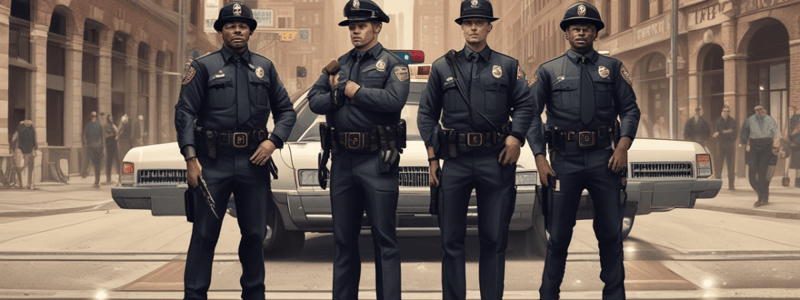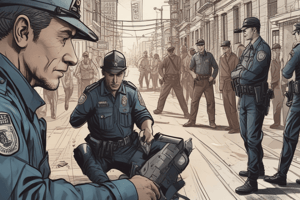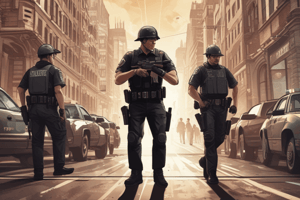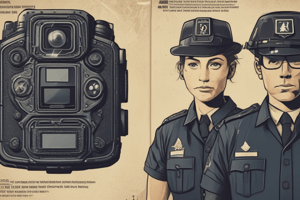Podcast
Questions and Answers
What is a primary motivation for a police officer to stop an individual?
What is a primary motivation for a police officer to stop an individual?
- Seeing the person drop or conceal themselves
- Suspicion that something is 'not right' about that person (correct)
- Believing the person is hiding something
- Witnessing the person staggering or weaving while walking
What does a good peace officer always do?
What does a good peace officer always do?
- Take notes on every individual encountered
- Always be on the alert for anything out of the ordinary (correct)
- Assume everything is ordinary
- Wait for crime to occur before taking action
What are areas that foster crime or have a crime problem deserving of?
What are areas that foster crime or have a crime problem deserving of?
- Increased surveillance
- Special attention (correct)
- Less police presence
- Ignoring them
What is a field interview?
What is a field interview?
What is required for a temporary detention for a field interview?
What is required for a temporary detention for a field interview?
What is an example of 'suspicious' behavior?
What is an example of 'suspicious' behavior?
What is the primary purpose of a Field Interview Report (FIR)?
What is the primary purpose of a Field Interview Report (FIR)?
What information is typically required to complete a FIR?
What information is typically required to complete a FIR?
What is the purpose of the 'remark' section in a FIR?
What is the purpose of the 'remark' section in a FIR?
Why may a recruit need to provide additional information during a FIR demonstration?
Why may a recruit need to provide additional information during a FIR demonstration?
What is the purpose of the instructor's role in the FIR demonstration?
What is the purpose of the instructor's role in the FIR demonstration?
What is the scenario used for the recruit FIR demonstration?
What is the scenario used for the recruit FIR demonstration?
What is a reason for reasonable suspicion during a field interview?
What is a reason for reasonable suspicion during a field interview?
What is the purpose of the RSMo 575.190 statute?
What is the purpose of the RSMo 575.190 statute?
What can happen if a person refuses to identify as a witness?
What can happen if a person refuses to identify as a witness?
What is the recommended distance for an officer's 'safety zone' during a field interview?
What is the recommended distance for an officer's 'safety zone' during a field interview?
What should an officer do when approaching a vehicle during a field interview?
What should an officer do when approaching a vehicle during a field interview?
What is the primary purpose of a Field Interview Report (FIR) form?
What is the primary purpose of a Field Interview Report (FIR) form?
What should an officer do when conducting a field interview?
What should an officer do when conducting a field interview?
What is a requirement for a person to be charged with refusal to identify as a witness?
What is a requirement for a person to be charged with refusal to identify as a witness?
Why should an officer quiz people who arouse suspicion?
Why should an officer quiz people who arouse suspicion?
What is an important aspect of an officer's expertise during a field interview?
What is an important aspect of an officer's expertise during a field interview?
Flashcards are hidden until you start studying
Study Notes
Field Interviews
- A field interview is a brief, informal interview with a person, usually away from the police station, to gather information or clarify suspicious behavior.
- The decision to stop an individual is based on the officer's suspicion that something is "not right" about the person.
Justifying the Stop
- Suspicious behavior may include:
- Hiding
- Changing direction of approach upon seeing the officer
- Dropping or concealing oneself upon the officer's approach
- Carrying unusual objects
- Staggering or weaving while walking
- A good peace officer is always on the alert for anything that appears out of the ordinary, considering factors such as:
- The location
- The time of day
- The habits of local people
- Crime can occur anywhere, anytime.
General Grounds for a Temporary Detention
- A rational suspicion by the police officer that some activity out of the ordinary is occurring or has taken place
- An indication that connects the person under suspicion with the unusual activity
- A suggestion that the activity is related to a crime
- The person fitting the description of a wanted person
- A verbal comment or statement from an officer or citizen causing reasonable suspicion
Questioning Witnesses
- Verbal communications from other officers or citizens can be grounds for reasonable suspicion
- When obtaining information from a non-suspect or witness, there is no Miranda requirement
- A person who refuses to identify themselves as a witness can be charged with Refusal to Identify as a Witness (RSMo 575.190), a Class C misdemeanor
Proper Tactics for Conducting a Field Interview
- Observe the person for a few moments before approaching
- Implement proper tactics while conducting the interview, such as:
- Standing at an oblique angle to the subject
- Positioning oneself with cover nearby
- Maintaining a "safety zone" of at least six to ten feet
- Keeping the subject in sight
- Controlling the subject's hands before beginning the field interrogation
- Approaching a vehicle with caution, using the right rear fender as cover
FIR Form (Field Interview Report)
- A one-page, fill-in-the-blank report form used to record pedigree information and basic facts learned in the interview
- Information required to complete the FIR includes:
- Date and time of stop
- Address of stop
- Full name, nickname, and home address
- Home telephone number
- Full description of the subject
- Social security number
- Operator license number
- Complete list of clothing worn
- Full vehicle description
- Circumstances surrounding the stop
Studying That Suits You
Use AI to generate personalized quizzes and flashcards to suit your learning preferences.




